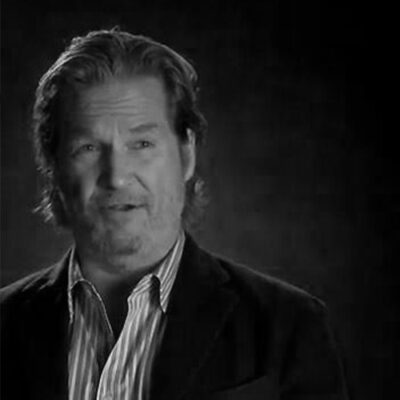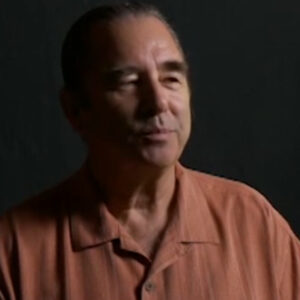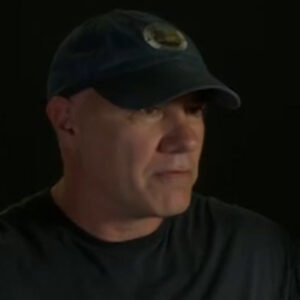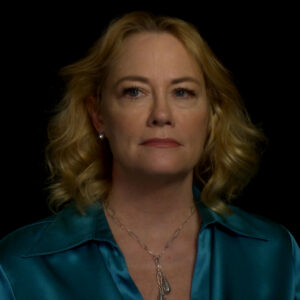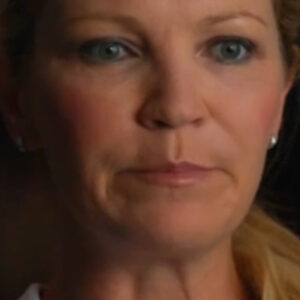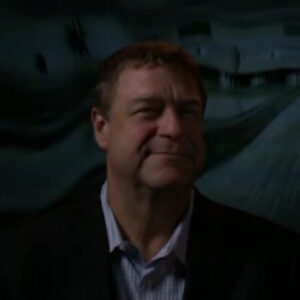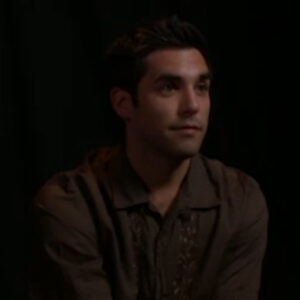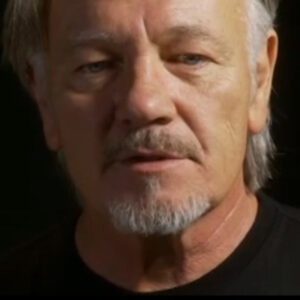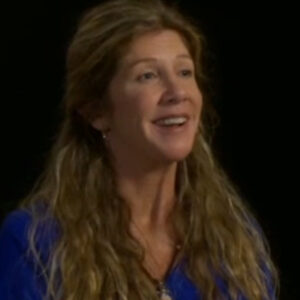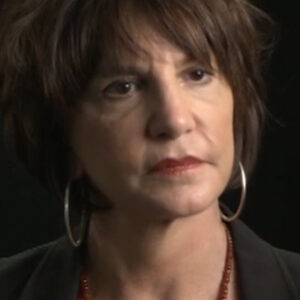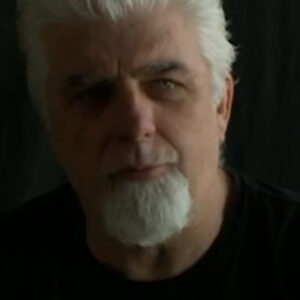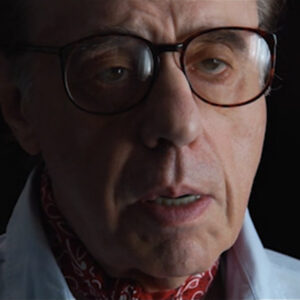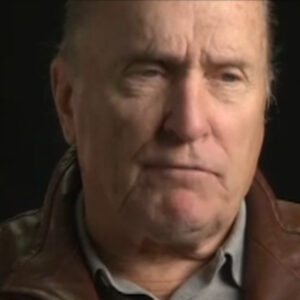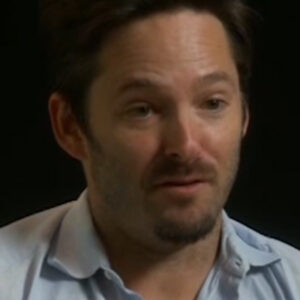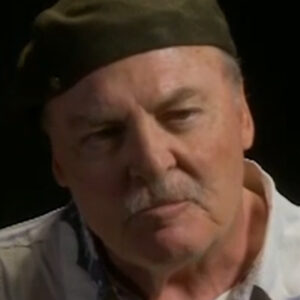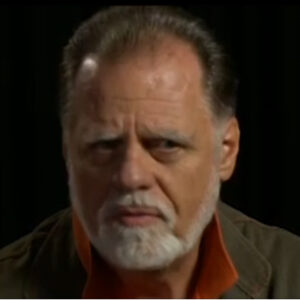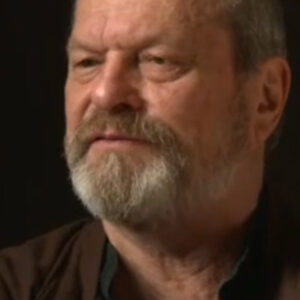Speaker Yeah, I’ve been an admirer of Jeffs my whole life, man, Jeffs careers is older than me.
Speaker But I you know, I feel now, having worked with him and having become his friend, that I’ve known him forever, he has that effect on you. I think, you know, I think that he just has really changed my perspective on a lot of things, including Hollywood and my career. And so I feel very grateful that we had the chance to work together and I had the chance to really learn from him. But having said that, I feel like I’ve been learning from him for years because just watching his work. Tell us a little bit about how his perspective is or how your perspective has shifted. Well, watching Jeff behave on and off set is really a masterclass in just how to be a good human being and a good artist. His perspective on his art is very unique and that he enjoys it immensely takes a very seriously. But he he doesn’t let it oppress him. There’s nothing there. You don’t want to call it work when it comes to Jeff, because he really enjoys every moment. And I remember we’d be shooting Tron, you know, 17 hour days. And I would be saying, gosh, Jeff’s really hanging in there.
Speaker You know, it’s he’s you know, I kind of assume that he’s this giant movie star and he’s Jeff Bridges, and maybe he won’t let them keep him for 18 hours on set and maybe he won’t be so polite about it. But no, he was just so cool. And in fact, we would share earphones and listen to Alan Watts lectures in our Tron suits on this immense glow, an immense glow in the dark set. Jeff and I would be sitting there in the dark waiting for the next setup. Endlessly waiting with one ear, but each listening to these lectures and he looking at be like, ha, right. Cool ha.
Speaker And and so, you know, I was learning from him as an actor and also as a person because as we would rehearse together and then work together playing his characters who were like family, who had in fact been in exile together for hundreds of years and, you know, had a very, very intimate relationship in a very familial relationship. I I really wanted to establish a relationship with Jeff Offset so that we could feel that familiarity. And that’s not hard to do with him. You kind of instantly feel you can have that with him because he’s so open and loving. But one of the first things we connected on was Buddhism. We started talking about spirituality and Buddhism and I said, gosh, I’m so into it, I’m so interested, but I don’t know anything. And. And he said, well, you’ve got to read Bernie Glassman and he’s just gonna ask you about it. Yeah. Yeah. So I think he gave me Infinite Circle. And I read the book and I said, Jeff, this is exactly what I’ve been looking for because I’m this, you know, an activist at heart. I want to change the world, but I’m so interested in Buddhism. But I don’t understand how the two can go together. How can I be okay with everything and accept the world, but also want to change the world? And Bernie seemed to be laying that out about how to be a, you know, a social activist and a Buddhist at the same time. And I was so inspired. And so I came back to justice. My mind blown.
Speaker And he’s like, well, you should hang out, Bernie. You know, just think Jeff’s responds to everything you could say.
Speaker You know, I really want to, you know, be anybody. And he’d say we should just hang out with them because that’s he sees everyone as family. But anyways, Bernie was a sort of spiritual adviser for the film. Yes.
Speaker He told us a little bit about actually sort of being involved in some of the maybe he secrecy, but.
Speaker Well, yeah, it was very important to Jeff that Bernie have some sort of influence over the script as it developed. He wanted the Tron sequel to have a kind of mythical message to it, to have some some kind of spirituality, some some kind of larger story. And he wanted Bernie to be the one to influence that. And it made a lot of sense because this character, the Jeff, was playing a sort of like this, you know, I mean, he would, of course, explain it in a much more eloquent way, and I’m sure he has. But it it every character sort of fit into a kind of a Buddhist myth. And for my character, it was very helpful because she has this completely compassionate being, this totally selfless kind of next step of evolution. Jeff’s character’s creation, and he liked the idea that she was this entirely perfect Buddhist ideal. So once he kind of got me onto that and I started understanding what that really meant, then we could I mean, then the character really started coming together.
Speaker It was very helpful on set. And we can kind of speak in these terms that I was learning from Bernie’s work as I continue to read it. And the cool thing was that it just made it all very accessible. But there were meetings we’d have in the production office where we’d Skype with Bernie. And I remember this guy. He’s been trying to say, you can’t go there. Let’s just say, oh, yeah. But the funny thing is Jeff was teaching Bernie how to Skype. And I’ll never forget we were in a table read. And Jeff wanted burning to be able to watch and listen to the table read to give his thoughts. And. And Jeff’s trying to talk to him. And all we can see is the top of Bernie’s head. Little like looking dog. He doesn’t know where to look into the camera of the computer. So we just see he said, look, we can go searching.
Speaker And just like Bernie. Look out, we’re here. And he looks up like, oh, hi.
Speaker And there is this guy who I had been reading so much of. You know, I’ve been reading all of his books that I could get my hand on hearing so much about him from Jeff. And then he was just this sweet guy who I really, really, you know, got a kick out of after I got to talk to him over Skype.
Speaker And from that point on, which was, you know, two months before we started shooting, then Jeff and I really connected over that. And I got to keep learning from Jeff in terms of all of the, you know, his life experiences and the literature related to his study of Buddhism and just social activism and and everything else that we had in common.
Speaker And his interest in integration, when you say it that way and even when you think about Tron, you think about the first Tron to this. Exactly. That’s a pretty amazing little path in its own right.
Speaker Absolutely. I mean, the interesting thing about Tron is that when the first one was made nineteen eighty two, Steven Liss Burger, the director and writer, was really making something kind of experimental. I’m almost shocked that Disney bankrolled this crazy experimental movie.
Speaker The only thing about it, because I just looked at it now and I don’t think I looked at it since then. I just looked at it again and it’s so remarkably ahead of it.
Speaker Yes, it’s yes, it’s very ahead of itself in its philosophy and in its in the question that it’s asking me. And the interesting thing about the sequel being made almost 30 years later is that that is the appropriate amount of time to have passed in order for the philosophical question to be relevant again and for the technology to have evolved to a point where it’s relevant again. It kept itself. It kind of catches up with itself now. Exactly. So the first film is asking the question, you know, what would happen if technology took over, if we became swallowed up by it, if if it became our master. Second film is saying, well, we know that’s happened. We’re completely dependent on technology. Now, what can we harness its power for good? Can we retain what it means to be human? And can we appreciate that? And so it really made sense that Jeff wanted to involve Bernie. But, you know, just that on its own, his his deep appreciation for the message the film should have and his responsibility, he felt towards the film and towards the audience was so unusual and and really made the film a better piece. And I think that, you know, without him, of course, the film is nothing.
Speaker Well, you have the unique opportunity to do something that he did only one other time, which is to be in the next phase of a story that started 30 years.
Speaker Right. He did it with Last Picture Show in Texas. Right. And now he does it with the trons I call this when the neutron. The new dry. That’s good. I know. That would have been a good title anyway.
Speaker But I think that there’s that’s another your you gotten to participate in something else that’s rather unique to you.
Speaker Yeah. Yeah. It’s a really interesting experience to be a part of, you know, an evolved state of an earlier piece of art and to be able to do that with a person who was in the first incarnation of that piece of art. That’s really unusual to be able to ask Jeff, what did it. And Steven, this burger and Bruce Boxleitner, who’s also in our film, you know, what was it like making the original what what did you feel about seeing words like bit and program when that really wasn’t a part of the daily vocabulary of computer users? Nobody had personal. I mean, some people had personal computers, but it was obviously a an unusual kind of story about programmers and very techie people, whereas the new film is about all of us who have now all become dependent on this technology.
Speaker Look at the old man now and you go, oh, my goodness, this year. And again, we’re speaking of that sort of Buddhist, all encompassing every existing line, all levels being all things. That’s another thing. It’s in that film without in one sense, without you even. Right. You never trying. And you know what level of consciousness. On where are they in the game, are they out of the game, are they right?
Speaker No. Are they? Exactly. Exactly. And, you know, it’s really interesting and unique to Jeff that in the midst of this kind of epic tale that involves all this kind of technological babble, Jeff is able to behave is just in a very natural way. It’s just a guy so that the audience feels as they do, I think in all his films that they could be him, that he represents them, that there’s this kind of real humanity to the performance that lets you relate. And it’s so much harder than it looks to do that within a kind of sci fi, green screen production, you know, to watch Jeff kind of do it. I remember we were doing a dinner scene, and if it weren’t on this giant soundstage on this in this giant soundstage, on this giant set in Tron suits with all this incredible 3-D equipment around, it could be just the typical awkward family dinner and a play, you know, in any small story. And that’s how Jeff was playing and that’s why it works. But it was such a great lesson for me and I think the other actors to watch how to behave naturally and how to be so unselfconscious even inside of this enormous structure where the acting feels like probably the least important thing because, oh, my God, it’s 3-D and it’s light up and it’s huge.
Speaker It’s it’s easy to forget that it is just a story about people and about humanity, which is another good message out of this, because if what we’re saying is, my goodness, we are.
Speaker Exactly. It all comes together. Good message. Yeah.
Speaker We come back into this and it’s really our own humanity and it’s the humanness of any of us. It’s going to it’s going to be a sort of the salvation of the redemption of any right of anything. Exactly. For you, though, also. What. I mean. What aspects of the two of you working together? I mean, you are dealing with. You were dealing with something there. Now also dealing with the Oscar winner, right? Dealing right now, meeting somebody. To that, I’m assuming had was formidable in some in some respects to you.
Speaker Yeah. And although I remember my first rehearsal with Jeff, we were in Vancouver and I was so nervous and I had the entire script memorized.
Speaker And I showed up and kind of bowed awkwardly. Remember, you don’t have to battle. But it feels like you should bout someone you really respect and sat down stiffly and he’s just so cool and is just so at home and. And we are. He’s like, let’s just forget the scriptures again and just like, tell jokes. Try to remember every joke I’ve ever heard. Not be able to remember one joke I’ve ever heard. And he goes, what do you call a what smells but has no sound? And I’m like, yeah, I don’t know what. And he’s like a bird fart.
Speaker Okay, I’m not nervous. I think I understand. Jeff, that moment I was like, okay, this is.
Speaker This is an easy guy to work with. It’s just disarming.
Speaker What is it like also having all of this contraption around you? Because I have heard and heard him talk about the suit and never talk about that. You know what all of this stuff is, which also does put another layer between you and.
Speaker Yeah, and well, it’s funny because the suits were, you know, so, so very challenging. And they were they were challenging in a different way than the original suits were. As Jeff describes it, you know, in the white leotard with the dance belt, this one was really a piece of armor. And we had these real LCD lights running through them with had that had wires. And so you couldn’t bend because the wire would break into the light would go off. So we didn’t have chairs. We had inversion tables. And I remember just lying back on this inversion table next to Jeff’s inversion table, and he’s just kind of loving it.
Speaker It’s like this is great for my back.
Speaker And it’s this weird experience to not be sitting in the typical setting on set on, you know, your little director’s chairs and and getting to know each other in that way. We were literally like lying upside down in these strange rubber suits, often playing pigs, which I’m sure he’s told you about, pal. He said, you’re the person to tell me that. Really, you know, I had to pick my path. Oh, I’ve done I’ve done it. He loves Pig. And you go do it, you pigs. Okay. So it’s funny. Give me give me out of this. OK.
Speaker So when I when I first started, you know, when I first heard that I was going to make a movie with Jeff Bridges and I was so excited, talk to a few friends who had made movies with Jeff and they said, oh, just wait, do you play pigs? And I was like, what? What is this pigs? Now everyone’s mentioned pigs. And sure enough, the first they were on set is I want to play pigs.
Speaker Like, what is that? This is pigs. Yes. I want in whatever it is, I have to play pigs.
Speaker And it’s literally little tiny. And I really love so many things. I love tiny things that it’s really appealed to me. It’s little mini pink pigs. And there’s a few of them. Three of them, I think. And you see two or three of them together. OK, so you have three little mini red rubber pink pigs and you throw them and depending on how they fall, like it’s like with down on their heads or on their bags like this or like sideways like this, a certain amount of points you get and this game can go on for many, many, many, many hours and did on the Tron set. But it was so fun because it was like it would take you completely out of the situation. You were in this challenging, you know, physically uncomfortable, oppressive, exhausting situation and suddenly you’re just playing pigs. And I love that it’s this consistent experience of, you know, all these different films that’s people plan pigs with Jeff, you know, whether in the deserts of Santa Fe or, you know, in the streets of New York or on a soundstage in Vancouver playing pigs, I want you to know that one person has told me about really yet.
Speaker Well, pigs really means a lot to me now, now that I was this in my speech that no one else is going to get this, but like a little made up game of yes. No, it’s a real this is a real game. Pigs, it comes with a little case and it has a little instruction seat where you shoot, where you keep your points and it has directions for, you know, how to play it properly. But it’s just little pig pigs that false. Now down. And I forget all the you know what the most valuable movies. I was never very good at pigs. I just love playing with Jeff.
Speaker The other thing I wanna talk about is you the two of you are in Comic-Con at Comic-Con together. Oh. What you also are now is a comic con character. I mean. Yes, which the this is so profound in the world to right now.
Speaker So aside from all the technology, you know, that this an animation character, that would be the superhero characters, the characters, that sort of fictionalization and and whatever hype about that, because I think that that’s also it’s another wonderful place to inhabit.
Speaker Yeah. What was really interesting about being in the Tron story in this incarnation of it was that we were really. Kind of mimicking what happened in the original Tron. I mean, Jeff puts it best when he says, you know, in the first film I was I pretended to be downloaded into a computer and the second film actually was downloaded into a computer. We were all turned into these digital beings here, the most extreme sense because of his face replacement, which is so extraordinary. But we were all turned into these, you know, little strange characters that they could animate in any way they wish, which is kind of terrifying to think about it. But it’s also pretty cool. And it means that we’re a part of this new crop of of actors who have had this experience, who have been turned into, you know, their digital form. And it’s a new thing. I mean, with it, with the motion capture fish face replacement technology, Jeff and Brad Pitt are really two of the only people to have had that done. And if this new thing that who knows where it will go? I mean, you think about it. If we have 35 year old Jeff Bridges. You know, Jeff Allen against all odds, age in Tron. You could make a film that you have young Julie Christie cause during with young Clint Eastwood, you know, with young Jeff. With young Vanessa Redgrave. It’s kind of limitless what you could do if you had limitless funds. But it’s just interesting and kind of amazing to be a part of this new wave of technology and again, to witness it being experienced by someone like Jeff, who’s still just behaved as if he were he were on stage and, you know, in a theater. It’s it’s really incredible watching this mocap thing. Just to take you through it really quickly, what he had to do was there was a body actor who played young Jeff’s body, and then he worked what I called the Teletubbies head, which was like a sock with sensors on it. And he had to watch Jeff perform the scene and then tried to mimic exactly what he did physically so that his body would reflect the way Jeff wanted it to behave as his character clue. Now, there’s probably no more interesting and challenging actor to mimic than Jeff Bridges physically because he’s so unique in the way that he moves. I mean, he he smiles with his whole body. He frowns with his body. He laughs. He exclaims, everything is like happening everywhere. And so this guy was a very athletic guy. I think some sort of professional football player was exhausted after, you know, playing Jeff for a day because just the little movements that made up the character that Jeff was so brilliantly crafting were so intricate that it became, you know, it was totally exhausting and very difficult, but amazing. And I just thought that watching that come together was really fascinating. But no, it is interesting to be a part of this kind of Comic-Con culture.
Speaker Well, and, you know, you say cool abides now. Yeah, in a way. What’s nice about it is this is, again, that sort of lousy audience starts to be that audience of young guys, young kids, people who are tapping into him, this amazing, really this amazing ride he’s had of staying so relevant. Yes. To so many age groups all at the same time. Yeah. And, you know, then and now he comes back again, as in try and legacy. Yeah. Which is gonna hit a whole nother generation of. That’s that’s that crowd of of the masses. I mean these are comic book people, the people who are it’s just fascinating to me. And these characters have this in this case, certainly have the ability to really live.
Speaker Yeah, it’s interesting. There’s a new wave of these kind of genre films that have really interesting actors in them and really interesting directors making them. I think it started with, you know, Chris Nolan making The Dark Knight, making it so brilliant when Batman didn’t necessarily have to be so great before. And Iron Man really kind of took it to a new level with Robert Downey. And Tron is the genre film, the sci fi epic adventure that has someone as brilliant as Jeff Bridges in it. And I think that makes it it elevates it to another level, gives us a whole lot of cred, particularly with that Comic-Con audience, that I think they are the most discerning of all audiences because they get a lot thrown at them and they can make or break a project. In fact, Comic-Con is the reason for Tron Legacy because when three years ago they brought test footage to Comic-Con to kind of feel out the response and see if people wanted a sequel. They showed the three minute test with Jeff in it and people went insane and it went viral. And that’s the reason the studio greenlit it and that’s the reason we got to make the movie. So, you know, when there’s that kind of demand for a story, it’s such an honor to make it happen and to bring it back to them, to show it to them and thank them for it. But they really appreciate that really great actors like Jeff are doing the movies, that that means so much to them that are that genre that really gets them off as kind of fantasy, amazing sci fi world that they care so much about involving these brilliant veteran actors. It’s it’s exciting for them and exciting from us.
Speaker And I also think you’re right, and this is a very discerning crowd. Yeah, I think this. I know that that’s how they market it. We have also pretty damn brilliant in the eye, right? Totally serious. Fascinating.
Speaker Yeah. Their people were so eager to have this movie made that Disney really didn’t have to do a lot initially to get the word out because people were kind of spreading it on their own, which is an entirely new phenomenon. That’s kind of amazing, just in its own right. The fact that things just spread is good and bad in that movie.
Speaker You really in the ether of that with this kind of film? Yeah, that is viral, immediately viral. And immediately when it’s hot, it’s hot. Right. But he’s ready for it. Right. I do not ask a little bit about the director because I know Scott didn’t direct the second line. Right. This is now first. I had Jeffie. The one thing that Jeff did say is, can you imagine this first time Garcia does this film?
Speaker Yeah. And for some production designer, so amazing. Yeah. Joseph Kazinsky was the right guy to make the sequel because he had a unique. I just like Steven. This burger had a unique 1982. Joe was coming from a new place. He he had made kind of beautiful, epic, wild commercials before and was kind of the first person to approach Tron with a lot of respect for its original aesthetic. But taking it to a new level and I’m updating it in a slick and and relevant way without losing what makes Tron Tron. And he really loved the story and loved the characters. And so he was the right guy to do it. And, you know, Jeff wouldn’t have done it, obviously, if if not for an interesting director. And I think that’s what made everybody else feel kind of comfortable with Joe Kazinsky to begin with without knowing him was like, well, Jeff likeSome and Jeff believes that he’s the one to do it. So it gave everybody faith. And he was fantastic. He really has this incredible visual taste, very specific and very kind of fresh and new and slick that is unlike anything I’ve ever seen before.
Speaker So I think he was the right guy for the gig. Well, I also think that you’re also try something else that one seems to see in Jeff is his real willingness. And it’s good. It’s good. Yes. And him and to go with it and him and not and he doesn’t need it. He doesn’t seem to need I should say I know this very well, but I mean, just in terms of my experience with him and looking at over this body of work, if if whatever captures and captures him.
Speaker Yeah, that’s another lesson that Jeff taught me about how to approach my career, is that the way he makes choices about material, he never wants to play the same character twice. You know, even and try and he’s doing the sequel. But as characters evolve to a completely different state, he’s a different person. But when he chooses things, no matter how big the project is, the money or who’s making it, if he’s not interested in and if he’s not passionate about it, he won’t do it. But he’ll take risks on people, you know, obviously with crazy hearts. First time director and Jeff connected to the material and it was obviously meant to be. But he has a certain fearlessness about his career that he’s not too self-conscious about it. It’s just whatever he enjoys doing, which is why he’s so consistently good. You know, the second you’re forced into something because you feel you should do it. That’s often, I think, when you see the worst work of your own. But no, I would constantly, you know, ask Jeff questions about what do you think about should I do this? And is this the wrong kind of approach to this? And how do I deal with this kind of thing? And it was great to have the benefit of his wisdom.
Speaker And I still use him and I’ll continue to use him.
Speaker I think you guys are kind of your area. I hope you have a next. I hope you have a next run at this. I do, too. I know. I’d love to. It’s cool because the this story that’s established in this incarnation of Tron is that we have been in hiding together for hundreds of years and that he’s taught me everything I know and I’m his apprentice, but also his protector. And if we were to make more of these movies, there’s so many stories that come from that. So it’s interesting. We kind of laid the groundwork for some really interesting stuff. He’s sort of like a father. But but in another way, you know, a partner. And it’s it’s it’s an interesting kind of dynamic. And I’m glad you took the time to establish that, because now it’s kind of fertile ground. And so we’ll see what comes of it.
Speaker Is it this is going to take hold in an incredibly interesting way. And even the other thing I was thinking just while you were talking to is how he makes these films first. Tron even thinking of many films along the way with him, star man, you know, numbers of films that have been lovely films. They’ve been lovely films in their moment. But, you know, somehow. But yet they are so resonant. Still trying to try to steal one of those films. And really remember, you go back and look at it, even with this kind of hand madness, you know, such beauty to it. And it’s got such vision to it and it’s great. Yeah. And so the fact that he also has the ability to age with these characters. Yeah. And stay and and still he there’s something about that too that’s quite unique among actors I think.
Speaker That’s absolutely true. You know, the other thing is that he was so encouraging of us. You know, Garrett Hedlund and I are both these young kids who got to work with Jeff. I mean, it’s such an honor. And he was so encouraging and respectful the whole time.
Speaker Just about, you know, I would say give me direction any time you want. Just tell me I’m doing it wrong. Tell me. Promise me. I made him swear. I was like, promise me you’ll tell me if I’m screwing up and just criticize me in any way. I love it. It would be incredible to be directed by you. And of course, so not his style. But he swore to me he would. And one thing he was always great about was encouraging me to take risks. You know, I’d say imagine if in this scene I just burst out laughing, that would be crazy. And he’d say, Do it. Try it. Try that. Try this. And, you know, that kind of thing.
Speaker That encouragement to take risks was really, really valuable for my role in this film. And I think actually made the role. The thing that I find interesting about her. Are there are these quirky moments that Jeff was such a huge part of. And I think that’s why his his his his movies are so good and why his performances are so good. Because he’s loose. You know, he’s just he’s there. He’s completely there in the moment. I’d say that’s how he is in life as well. Something really struck me when I went to Jeff’s sixtieth birthday party up in one of SEATO.
Speaker He was making his his thank you speech, his birthday speech, and he said, I feel very close to death right now. And I kind of stopped and I thought, what does he mean? Is he ill? I don’t understand why is he saying that? But he was saying it in the sense of I feel so comfortable and happy with life that I feel very at peace with everything right now. And that really had a huge effect on me that he’s just at peace. And so that’s why he’s able to kind of live in the moment because he he’s not bogged down. He doesn’t he doesn’t weigh himself down with unnecessary. And I think that’s what you sense when you’re around in this kind of levity that comes from that and that openness that comes from that. But it was also this amazing moment of seeing someone who has the career that we all would die for. But also a fully formed identity and a family. And often I think actors think you have to sacrifice one thing for the other. You can’t have this, you know, long, successful and credible and beautiful and romantic marriage and children. If you’re going to be this giant movie starts doesn’t seem possible. And, you know, Jeff obviously has that. And I think that part of that comes from his ability to separate work and life and and his devotion to his art, his devotion to his family. And I think that I’m sort of I mean, my theory is that actors go from character to character to character. When you’re really on a roll, you just never stop. You’re always working and you jump from set to set in. And and, you know, personality to personality.
Speaker And if you’re not careful, you can become kind of an empty shell that you just fill with whatever the temporary identity is at the time that you are required to embody. And if you’re not careful and you don’t nurture who you really want to become and what you believe in and who you really are, you can become just the shell with kind of remnants of of of past souls that you’ve taken on.
Speaker And I think that’s why actors often become unhappy. People feel incomplete in some way. And Jeff doesn’t feel that way because he seems to have really nurtured himself and continued to learn and be a student of so many different things and and to continue to to, you know, just develop as a person. And that’s another really important lesson that I learned from him. And I remember on that night of his birthday, watching him and just seeing it embodied, seeing this complete person, this whole person who is able to transform, but who is not just an empty shell.
Speaker And that really gave me a kind of optimistic perspective on my own career, on my dream, knowing that it is possible to have this kind of balance. But I feel so lucky that I have a friend in Jeff that I can learn from. And it’s it’s an extraordinary honor to to have worked alongside him. But to be his friend is even more incredible.

